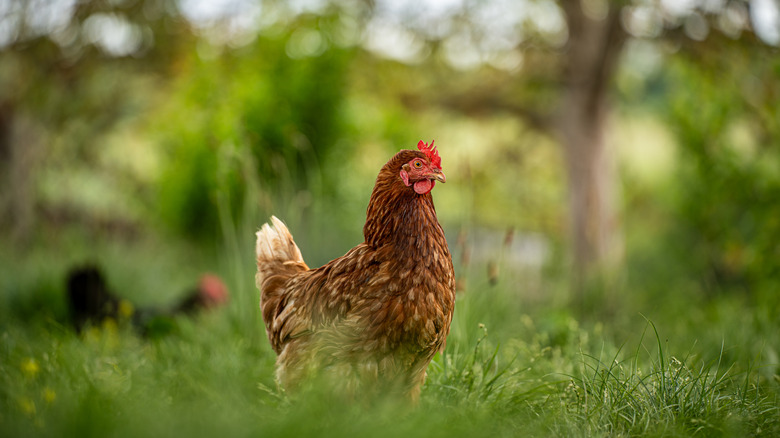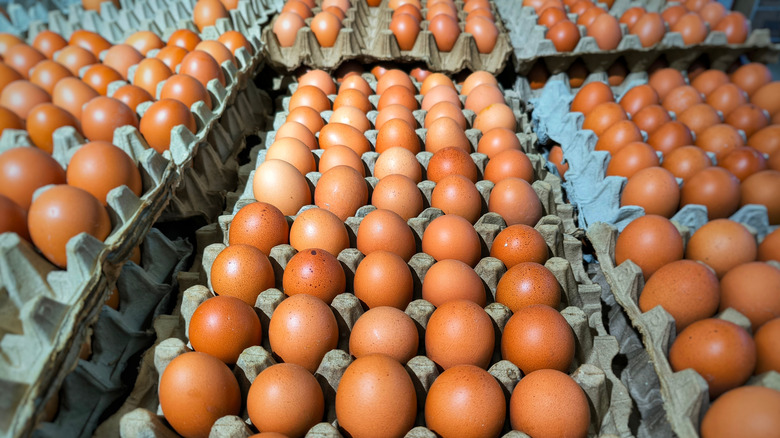What Does It Mean When Chicken And Eggs Are 'Pasture-Raised'?
I can remember strolling past a few chicken and egg packages marked as pasture-raised, wondering what that meant, and questioning why it even mattered in terms of the pricing. I eventually wrote it off without giving it a second thought ... but then a little bit of FOMO kicked in, and I decided to see what it was all about.
Pasture-raised refers to chickens that regularly have access to outdoor spaces where they can forage naturally. These birds roam the open pastures, eating grass, bugs, and other natural goodies. A pasture-raised lifestyle is associated with healthier, more nutrient-rich eggs and meat, not to mention better treatment for the animals.
There is a catch though — the USDA had not been regulating the pasture-raised label. However, it did introduce some guidelines this year to help clarify exactly what the term should mean. Despite these efforts, some organizations still feel that it is inefficient because these "stricter" guidelines are merely suggestions and not obligatory.
So, in essence, this means that the term can vary from farm to farm, leaving consumers to rely on certifications like Certified Humane to ensure they're getting truly pasture-raised products. Even if you're not a fan of eggs, it helps to know what the labels mean in case someone you know has considered buying them. Understanding what goes into this label can help you make more informed choices at the grocery store.
How pasture-raised stacks up against other labels
Admittedly, trying to understand all of the labels can be confusing at times. For example, what is the difference between pasture-raised, cage-free, and free-range? The lines can get blurred real quick, with each term losing its true meaning.
With cage-free chickens, they stay outside of cages but they're often in indoor barns with limited space to move and roam freely. A free-range chicken will have access to outdoor areas, but these can be small, and the time spent outside is often minimal. Pasture-raised chickens, in their truest sense, go beyond both labels by allowing the birds to roam in open areas, giving them more space, natural diets, and better living conditions.
This difference is reflected in the quality of the eggs and meat. Pasture-raised eggs tend to have darker yolks and higher levels of omega-3 fatty acids. They're also richer in vitamins like A and E, as well as antioxidants like lutein, which supports eye health. The meat from pasture-raised chickens is often more flavorful and tender, thanks to their varied diet and active lifestyle. Plus, it's free of antibiotics and hormones, making it a healthier option for families. If animal welfare and food quality are priorities, pasture-raised is the gold standard—just make sure the label is backed by trusted certifications.
Why pasture-raised matters for you and the planet
Choosing pasture-raised chicken and eggs isn't impactful solely for the better taste and wider variety of nutrients — it's also about supporting sustainable farming practices. Pasture-raised farming typically relies on rotational grazing, which can improve soil health and reduce the environmental impact of poultry farming. By letting chickens forage naturally, farmers cut down on the need for processed feed and reduce waste buildup in confined spaces.
However, it's important to recognize the trade-offs. Pasture-raised products are often more expensive due to the higher costs of giving chickens ample outdoor space and maintaining sustainable practices. The truth is, it's not a cheap venture, but it comes from animals raised the way nature intended. They're roaming freely on pasture, breathing fresh air, and eating wholesome, natural foods without any harmful additives in sight. For those who value quality, animal welfare, and environmental stewardship, the benefits often outweigh the price tag.


